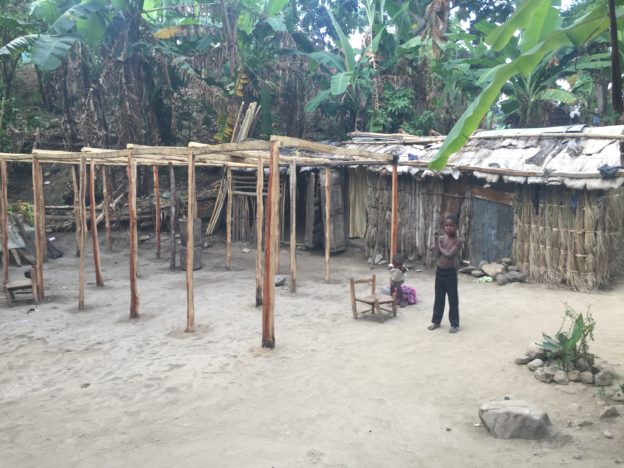Like many of the women from Kolonbyè, Rosana’s focus right now is on her home. We talk about “home repair” in CLM, but the reality is that most families need to build a new home from scratch. Either they do not have a home that belongs to them, or what they have is too flimsy to support the tin roofing material that we provide.
Also like many of the women from Kolonbyè – and those from the other areas we have worked as well – Rosana is finding the building process challenging. We provide some of the material. We’ve given Rosana roofing and nails, and we’ll pay the builders she uses. But that leaves a lot for Rosana and her husband to do. They need structural lumber for the support posts, the doors, and the beams their builder will attach the roofing tin to. And they also need whatever material they’ll use to enclose the house with walls. In Fon Desanm, that means palm wood planks.
She and her husband have jumped into the work, however, and they are making good progress. They built a small extension onto the rough shed they had set up for the goats we gave them, and moved their whole large family into it. Then they tore down their house to take the usable lumber, and started to buy the additional lumber they need. They acquired all the necessary support posts so that their builder was able to set up their new frame.
She has made some progress in other areas, too. Three of her older children are in school now, but the younger ones are not, even though at least two of them are old enough to go. Her three goats are doing well. All are pregnant and should produce kids soon. She hopes eventually to use their young to buy a cow. In some ways, a horse might be more useful because she could carry merchandise to and from the local markets. And the horse itself would be much cheaper than a cow. She doesn’t want to buy a horse, however, unless she has money to invest in merchandise, too. A cow, on the other hand, is a good investment all by itself.
She continues to manage her small commerce carefully, but much of the money she had in it went to buy and prepare palm trees. The CLM program started her off with 1500 gourds – which is about $22.50 – but she has only 700 gourds left. On Saturdays, she buys bread and sugar in the market, and sells it during the week from her home. Most of her customers buy on credit, and she goes around collecting on Fridays so she can buy again on Saturday. It is a challenging business model for a woman with a large group of small, hungry children, but she’s taught them to leave it alone. “They take the bread and sugar that I give them, and I give them what I can afford.”
Because she has very little money in the business, and turns it over only once a week, she can’t be making much money. And she’s not sure what direction she wants it to take. She thinks she’d need a lot more money to succeed at the kind of larger business that she could do in local markets, rather than out of her home. That’s because until you have your own pack animal, transportation costs are relatively high. They make it hard to make a profit.
But she knows that she has to be careful about increasing the business that she runs out of her home. She knows that she won’t sell more bread and sugar just because she buys more, so she’ll have to add other products, like rice. And the business’s dependence on selling on credit means it’s fragile, but it’s not something she can avoid. She says that little home grocery businesses like hers have to give credit to customers. They are your close neighbors. Many are family. And they are most likely to come to you when they just don’t know what to feed their kids. She has saved money from her weekly stipends that she could use to invest, but she’ll need to get her case manager to agree to any plan she comes up with. And Titon doesn’t want to release any more of it until her house is finished. She’s already burned through 800 of her first 1500 gourds and another 2000 gourds that she said she would use for additional commerce.
She’s going through a difficult time right now. Normally she’d have pigeon peas and millet at this time of the year, but she has neither right now. Rains that fell at the wrong moment hurt the pigeon peas, and for the second year in a row the millet crop was wiped out by disease all across Central Haiti. So she has very little coming in from the fields. But she’s nevertheless excited about the difference CLM is making. “I had no hope that I’d get help from anywhere, but God sent CLM to me.”
